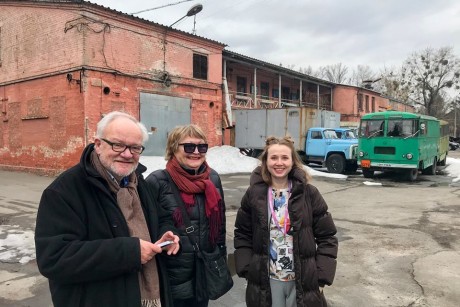


Film History/ Ukraine

Exciting it was to visit Dovzhenko Film Studios in Kiev, originating from 1927, carrying the name of Alexander Dovzhenko (1894-1956). And sad as well as the buildings stand alone (apart from a couple of sound studios and a fantastic store with props) and deserted – as I have experienced in other former Soviet republics, Latvia being one of them. But you can easily imagine the studio, that is like a small city in itself, with everything needed space-wise for big productions, flats for the important directors – and Dovzhenko was here.
Just to remind us, a text clip I googled:
”Along with Dziga Vertov, Sergei Eisenstein and Vsevolod Pudovkin, Alexander Dovzhenko is one of Soviet cinema’s early masters. Best known for his silent films, Zvenyhora (1928), Arsenal (1929) and Earth (1930), Dovzhenko holds a dominant place among avant-garde directors. It has generally not been recognized that Dovzhenko’s early canon was also an integral part of the Ukrainian cultural renaissance. This work looks at Alexander Dovzhenko’s Soviet Ukrainian trilogy in the light of the silent cinema’s early aesthetic and presents an analysis of the silent trilogy in the context of the Ukrainian Cultural Renaissance (1917-31)[2] and its dialogue with a wider modernist avant garde.”
The studio is today owned by the Ukraine state.
Photo taken by Roman Bondarchuk: Ellen Fonnesbech-Sandberg, Dar’ya Averchenko and me.